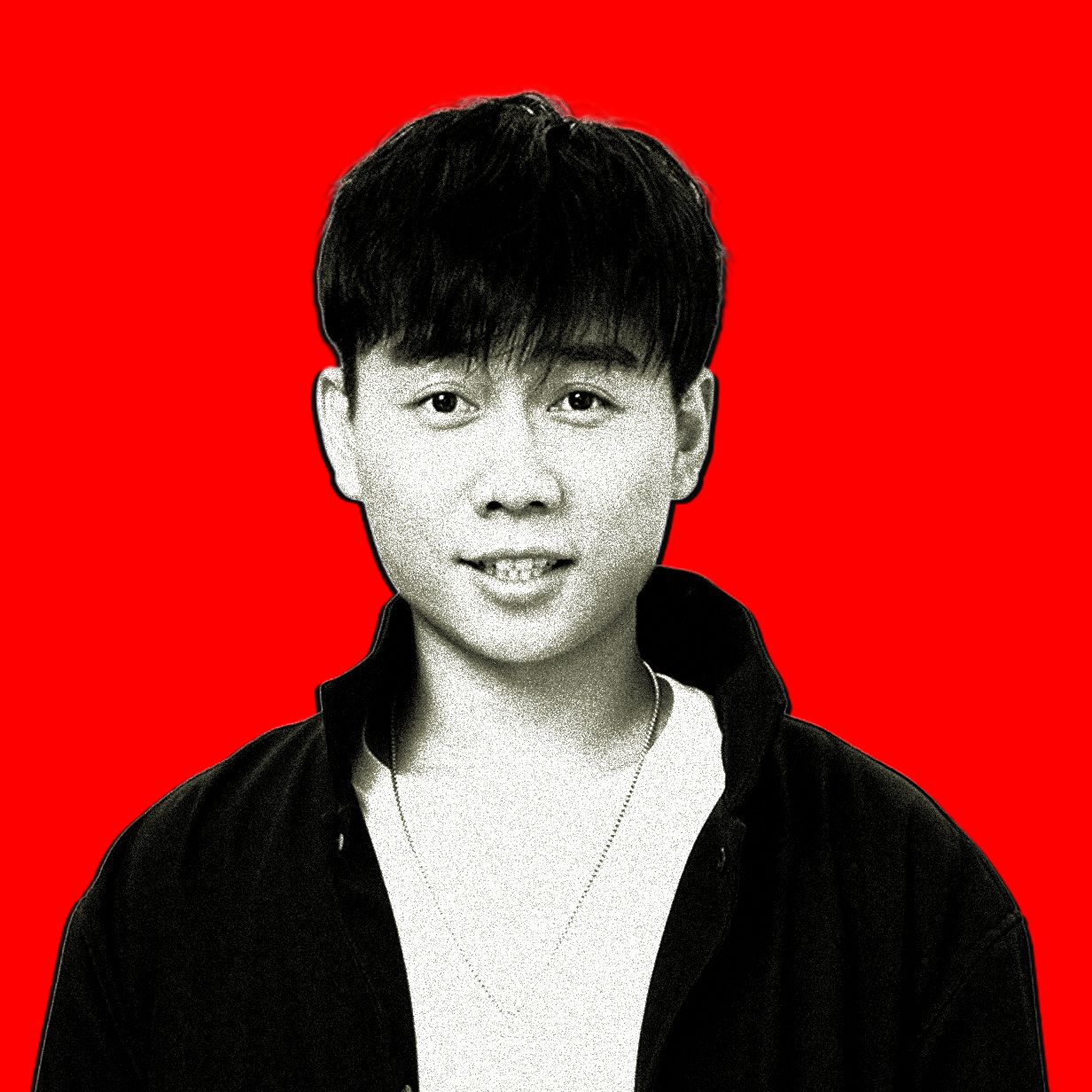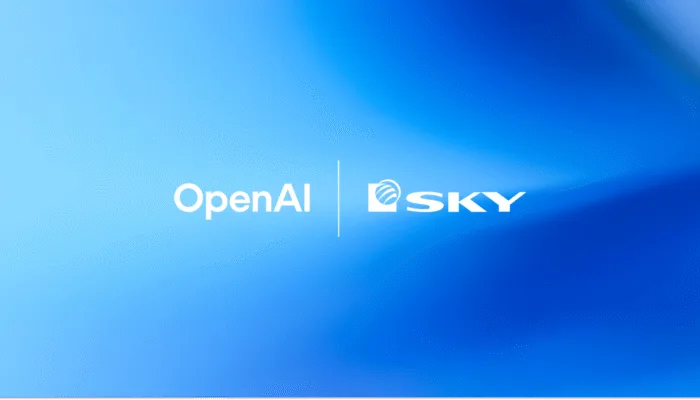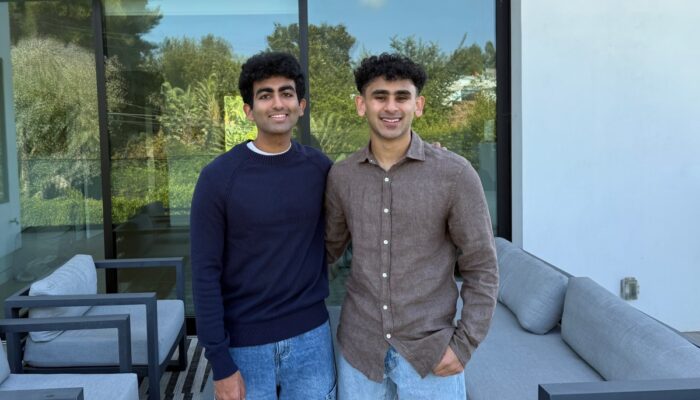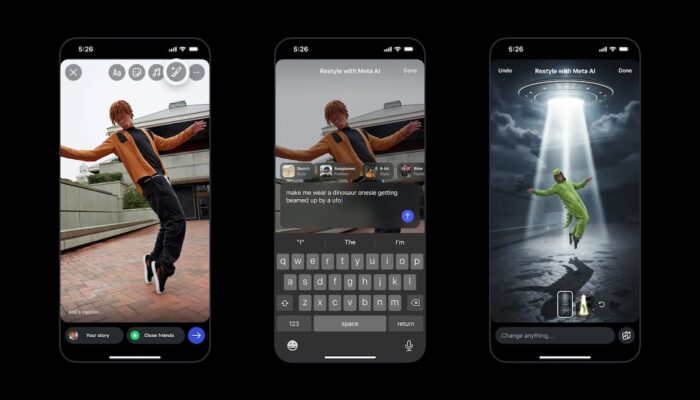Our fellow terminally online readers probably have seen this video, which originated on Chinese social media. In it, two guys who look at first like they are about to get into a fistfight suddenly break out into a romantic, yet slightly robotic tango dance routine. The next second, they pull a wine glass and a bowl of noodles out of nowhere. It really looks like it’s generated by AI, but it isn’t. It’s 100 percent human intelligence.
I recently talked to Tianran Mu, the 29-year-old Chinese creator behind the video (he’s the one holding the noodles), who said he was largely unaware of how far his AI imitation sketch had traveled. On X, two users who shared his video got over 11 million views combined. Other reposts racked up tens of thousands of likes on Reddit, TikTok, and Instagram. Mu, who has no presence on any of these platforms, had little knowledge about his virality outside China and had never been interviewed by international media.
Tianran Mu’s video titled “AI: “He’s using all my lines!”
Mu is not the only comedian who has tried to imitate the style of AI-generated videos, but he really nails all of the elements: The clumsy bodily movements, the spaced-out facial expressions, and the unpredictable plot development. Many viewers, me included, were shocked at how accurately he captured the essence of AI slop videos.
Mu tells me that the half-dozen AI imitation videos he has filmed represent only a small part of his acting career. He has wanted to be an actor since college and spent the summer after his freshman year at Hengdian World Studios—the world’s largest film studio—looking for background acting opportunities. He started making comedy sketches on Chinese social media in 2019, and content creation now takes up most of his time.
The success of his AI imitation videos earned him a sponsorship deal from a Chinese generative AI company, which paid him 80,000 RMB (about $11,000) to produce two more sketches promoting the company’s video model. That’s not a bad gig, but I honestly expected Mu to have received more opportunities through his global virality.
As part of the sponsorship, Mu shot two versions of the sketches, one that embedded AI-generated footage and one without it. He was secretly hoping that the advertiser would choose the latter, because it showcases human acting skills front and center. But the advertiser chose the one with the AI. “That kind of feels like it’s starting to steal jobs from human actors, doesn’t it?” Mu says.
Mu popped up on my timeline again last week when he released a sequel to his first AI imitation series, this time mimicking the videos created by Sora, OpenAI’s latest generative video tool. His new video is much more subtle but still manages to nail that unexplainably unsettling feeling that has endured even as AI videos become more advanced.
Mu says there is a perpetual battle underway as AI accelerates, but it’s not man versus machine. Rather, the clash is between humans and other humans who make AI models, and each side is constantly trying to one up the other. “We’re poking fun at some of AI’s flaws, its eeriness and absurdity, but the AI creators are probably improving those, too. You see, this year’s AI already looks much more human,” Mu says.
How to Act Like AI
Before he made his first AI imitation sketch in July 2024, Mu watched a lot of AI slop videos to study their common traits. He wanted to understand the kinds of mistakes AI often makes and then re-create them in his own scripts.
For example, when an object appears in the frame, AI often misunderstands its purpose for being there. For example, a hanger can be used to hang clothes, but it’s also often the weapon of choice when parents in China physically punish their children. That dual use inspired another one of Mu’s videos last year, where midway through pretending to hit his “son” with a hanger, the boy’s shorts mysteriously come off, and Mu looks like he suddenly forgot what he’s doing and decided to hang up the shorts instead.
Tianran Mu’s video titled “Note: This content was generated by AI. Please view with discretion.”
Another common issue in AI-generated videos is the lack of continuity—objects change shape, and humans change their appearances or outfits. In Mu’s most popular video, many people didn’t even notice that two different actors played the same role to imitate that same inconsistency. (Mu’s college friends act in all of his videos. They have day jobs but are willing to come back to star in his sketches.)
But perhaps the most eerie aspect of many AI-generated videos is the strange expressions on people’s faces. I saw lots of people commenting on how Mu mastered the empty focus of his eyes. He says that’s indeed another observation he made after watching copious amounts of AI slop and seeing how other creators mimicked it. “The AI’s gaze tends to wander—one moment it’s looking here, the next it’s looking there. When I’m talking to you, I might actually be looking at someone else,” he says. “Simply put, it’s unnatural, so just act unnatural.”
Tianran Mu’s video titled “When AI imitates humans, humans have to imitate AI back!”
Late last month OpenAI released Sora, a social media app that allows users to generate and share short AI videos. Mu says that when he set out to parody the clips people were making with Sora, he found it a lot harder to nitpick their flaws but still discovered a few. On top of the wandering gaze and timeline inconsistencies, Sora-generated human characters often laugh in an exaggerated, offputting way, with their hair shaking frantically in the air. Mu imitated that laugh in the new video he released last week, and once again, it really struck a chord with his Chinese followers.
Mu says he doesn’t have any immediate plans to make another Sora imitation, partially because the video quality has gotten so good that it’s now almost impossible to create parodies. “By this time next year, we might honestly have nothing left to imitate. If I try to act it, I’d just be acting like a human,” he says.
Will AI Replace Actors?
Many commenters have said that Mu’s videos reassure them that AI can’t replace people. But Mu himself is a lot less certain about that. As a director and content creator, he says he definitely sees the potential for AI to transform moviemaking. He thinks it’s likely that the world will see movie directors and producers using AI liberally within the next two years.
But as an actor, he’s scared. Outside of his social media sketches and small gigs doing TV commercials, Mu hasn’t gotten any real acting roles in a while. It’s already hard to compete with other hardworking actors, and soon AI actors may be coming to take his job, too.
Mu hasn’t used any AI-generated footage in his own content (except for the sponsored posts) because he wants to be known for his acting skills. His WeChat avatar is him looking at a birthday cake with an Oscar trophy replica on it, because winning an Oscar is the dream of his life. ”My ultimate goal is to write, direct, and star in my own movie—and win an award for it,” Mu says.
This is an edition of Zeyi Yang and Louise Matsakis’ Made in China newsletter. Read previous newsletters here.




